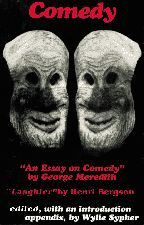Casting a critical eye on comic works throughout the ages, Meredith finds that the most skilled masters of the comic art—Aristophanes, Rabelais, Voltaire, Cervantes, Fielding, Molière—used comedy to grasp the essence of humanity. Comedy, according to Meredith's theory, serves an important moral and social function: it redeems us from our posturings, stripping away pride, arrogance, complacency, and other sins.
Bergson's essay looks at comedy within a wider field of vision, focusing on laughter and on what makes us laugh. His study examines comic characters and comic acts, comedy in literature...
Casting a critical eye on comic works throughout the ages, Meredith finds that the most skilled masters of the comic art—Aristophanes, Rabelais, Voltaire, Cervantes, Fielding, Molière—used comedy to grasp the essence of humanity. Comedy, according to Meredith's theory, serves an important moral and social function: it redeems us from our posturings, stripping away pride, arrogance, complacency, and other sins.
Bergson's essay looks at comedy within a wider field of vision, focusing on laughter and on what makes us laugh. His study examines comic characters and comic acts, comedy in literature and in children's games, comedy as high art and base entertainment, to develop a psychological and philosophical theory of the mainsprings of comedy.
Complementing the work of Meredith and Bergson in Wylie Sypher's appendix, as essay that discusses comedy and the underlying comic structure in both anthropological and literaty contexts. Sypher offers an enlightening discussion of the relationship between comedy and tragedy and their link with the ritual purging of evil from a society by means of a scapegoat. He then goes on to examine the guises of the comic hero in such figures as the Wife of Bath, Don Quixote, and Falstaff, relating them to such great tragic figures as Oedipus, Faust, and Hamlet.
Through the many perspectives it offers, Comedy will appeal not only to students of literature and literary criticism, but to those studying philosophy and history as well.






